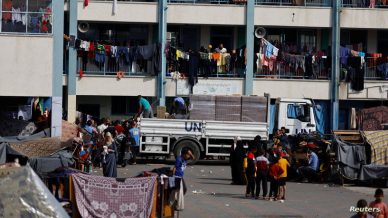Israel’s state comptroller report on the 2014 war on Gaza proves that the Palestinian resistance is just unbeatable Palestinian resistance movements Hamas and the Islamic Jihad said Tuesday.
Hamas spokesman Hazim Kassim said the 2014 war toppled Israel’s image as an “invincible superpower”.
Kassim reiterated Palestinians’ commitment to armed resistance as the only means to liberate the occupied Palestinian land and restore Palestinians’ infringed rights.
Meanwhile media chief at the Islamic Jihad in Palestine Daoud Shehab dubbed the state comptroller’s report on the 2014 Israeli war “an acknowledgement of defeat.”
“The Palestinian resistance is adept enough to take the wind out of Israel’s sail” added Shehab.
Hamas and the Islamic Jihad’s remarks were released on Tuesday as Israel’s State Comptroller Joseph Shapira published his landmark report on conduct during the 2014 Israeli war on Gaza.
According to the report the 50-day war led to deaths among the Israeli military and included 4251 rockets fired on the occupation army briefly halting flights at Ben-Gurion Airport and leaving most regions of Israel vulnerable at one point or another according to the Jerusalem Post version of the report.
The three central criticisms made by the report are: The war was avoidable; 50 days was too long; and Israeli prime minister Benjamin Netanyahu then-military chief of Staff Benny Gantz and War Minister Moshe Ya’alon did not properly prepare the army the security cabinet or the public for the scope of Hamas’s tunnel threat.
Besides those issues leaks have indicated that blame has been placed on Netanyahu and Ya’alon for keeping the security cabinet out of strategy discussions on Israel’s long-term plans for Gaza such that the war itself was not directed at particular long-term goals.
Netanyahu and Ya’alon among other Israeli leaders are expected to be hit with criticism that they did not share all necessary intelligence with the security cabinet.
The leaks also indicate that the picture presented to the security cabinet was devoid of the possibility that Hamas might overreact and escalate into a full war on any given incident if Israel escalated its military force beyond the usual targets.
Further the leaks indicate that the Hamas tunnel threat was only discussed by the security cabinet in March 2014 and only in a serious manner when the war was kicking into high gear.
Even within the military insufficient resources and attention were allocated to coping with the tunnel threat leaving the army forces on the front lines having to come up with ad hoc solutions for destroying them.
The unnecessary length of the war which had terrible consequences for Israel is said to be attributed to miscommunication between the political and military echelons.
The report also slammed the security cabinet ministers for failing to show sufficient interest or sufficiently preparing themselves on a range of issues regarding the war.
Collectively the report’s conclusions call into question whether the offensive was a success or a failure and whether top officials managed war and peace issues successfully or deficiently.
The report on the security cabinet’s decision-making processes and the Hamas tunnel threat are the second and third parts of a four-part report by the state comptroller on different aspects of the war.
The first part concluded that the security establishment had not properly prepared portions of the home front for Hamas’s rocket onslaught while the fourth part expected to come out soon will discuss the extent to which Israel’s use of force complied with international law.
Shapira’s leaked conclusions and criticism are believed to threaten the ouster of Israel’s Prime Minister Benjamin Netanyahu or permanently wound his “Mr. Security” image making him far more exposed politically when the next election comes along Jerusalem Post further noted.















